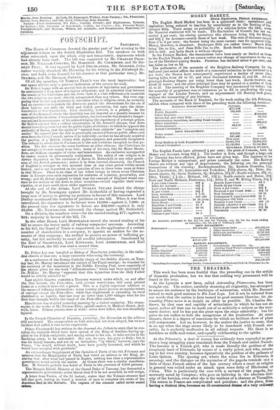POSTSCRIPT. SATURDAY.
The House of Commons devoted the greater part of last evening to the adjourned debate on the Jewish Disabilities Bill. The speakers on both
sides reiterated, upon the whole ably and temperately, arguments which
had already been used. The bill was supported by Mr. CHARLES PEAR- SON, Mr. WILLIAM Cowrart, Mr. HORSMAN, Mr. Cocaamew, and Sir Ro- BERT PEEL. It was opposed by Lord DRUMLANRIG, Mr. SPOONER, (who rather warmly attacked Mr. Macaulay for his writing in the Edinburgh Re- view, and Lord John Russell for his absence at that particular time,) Mr. SEIMER, and Mr. GEORGE BASHES.
Of all the speeches, Sir ROBERT PEEL'S was the most impressive: but our space allows only a general indication of the course he took. Sir Robert began with an avowal that in matters of legislation and government he entertained a deep sense of religious obligation; and he admitted that between the tenets of the Christians and the Jews there is a vital difference—in essentials
the two religions are more directly antagonized than any others. But even sup- posing that he had any authority to determine what IS religious error, he certainly had no commission to punish the Jews—to punish the descendants for the sin of
their fathers, not unto the third and fourth generation, but unto the three- hundredth or timr-hundredth. Civil disability, however, is a pecialty. In the case of the Roman Catholic the disability was not imposed as a penalty because he
maintained the doctriue of transubstantiation, but because he was deemed a danger- ous subject in consequence of his acknowledging the supremacy of a foreign prince.
Sir Robert entered into a critical examination of Dr. Arnold's dictum, that Jews
should have the private but not the public rights of citizens; to which he opposed the authority of Bacon, that the rights of "natural-born subjects" are "complete and
entire." He showed how the Jew is practically excluded from no public office—not even from the Privy Council, unless it be indirectly; so that he has already acquired the position of a British citizen with rights complete and generally recognized. The refusal to admit him to Parliament is the sole invidious exception to that po- sition. The Jew sustains the same burthens as other citizens; the Christians do not scruple to borrow money from him; many of his race, like Sir Moses Monte- fore, are brilliant examples of virtue and benevolence. An exclusion unsupported by reason cannot be permanently maintained. The safety of our religion is in nowise dependent on the exclusion of Baron de Rothschild or any other gentle- man of the Jewish persuasion: unless it be from internal dissension, the Church of England is stronger at this moment than at any other period within recent history, and is not dependent on the question of two or three votes more or fewer in that House. There is no class of our fellow beings to whom every Christian state in Europe owes such reparation for centuries of injustice, persecution, and wrong; and Sir Robert, rejoiced to think that the-example of England would con- duce to the welfare of the Jews in other countries—would expedite their eman- cipation, or at least sooth them under oppression.
At the end of the debate, Lord DUDLEY Srus.Rr denied the charge brought by Mr. Newdegate against Mr. Rothschild of having expended a
large sum of money in getting up petitions in favour of this measure. Lord Dudley mentioned the statistics of petitions on the bill. When it was first introduced, the signatures in its favour were 13,000—against it, 7,000: at
the present time the signatures in favour are 232,000—against it, only 35,000. Mr. NEWDEGATE reiterated the charge against Mr. Rothschild. On a division, the numbers were—for the second reading, 277; against it, 204; majority in favour of the bill, 73.
122 the other House, Lord MONTEAGLE moved the second reading of his bill to secure the better audit of railway companies' accounts. According to his bill, the Board of Trade is empowered, on the application of a certain number of shareholders in a company, to appoint an auditor for the ac-
counts of that company; the auditor to possess no power of inflicting pe- nalty, but full authority to exact all needful information. Sanctioned by the Earl of GRANVILLE, Lord KINNAIRD, Lord ASHBURTON, and Earl Firawtemate, the bill was read a second time.


























 Previous page
Previous page